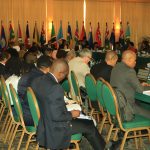In spite of challenges, Community continues to show resilience – ASG Cox

REMARKS BY THE ASSISTANT SECRETARY GENERAL, TRADE AND ECONOMIC INTEGRATION, JOSEPH COX AT THE OPENING SESSION OF THE 49TH REGULAR MEETING OF THE COTED, GEORGETOWN, GUYANA, 18 NOVEMBER 2019
Good morning. It is my pleasure to welcome you to Guyana and to a meeting of the COTED on behalf of the Secretary General who is unavoidably absent from these proceedings as he is representing the Community in other matters of critical import overseas. This Forty-Ninth Regular Meeting of the COTED continues the productive process that the Community has laid for itself, which is the fostering of this Region’s economic development. We continue to live in challenging times, not least in relation to the fiscal challenges that our governments face. We nevertheless continue to display a significant amount of resilience in our quest to build dynamic and innovative economies.
Chair, to quote the words of Prime Minister Mottley of Barbados, the regional integration process must make a definable difference and be citizen centric. If this regional project is to achieve its objectives, our people must feel the results in their practical day to day lives. This is why a major part of your agenda continues to be the deepening of the CSME with much of the focus being on the instruments that allow for the movement of CARICOM nationals for purposes of both business and pleasure. While it is recognized that there are technicalities to be sorted out, we should not let perfection become the enemy of the good and be guided by the age old axiom that “Individually we may go fast but Together we will go far.” The actions of the COTED and other regional and national bodies in this regard are therefore crucial to meeting the goals of people-based integration.
The COTED, of course, continues to supervise the regimes for trade in goods. While we have done a good job over the years of ensuring that the rules governing the regime are upheld, there are some instances in which we have not been able to satisfactorily resolve the difficulties that have arisen. It is therefore necessary that, as a Community, we continue to emphasize the need to comply with well-established rules and procedures. I also wish to emphasize the need to proceed with the comprehensive review of the Common External Tariff and related instruments. These arrangements have now been in place for more than twenty-seven years and are in urgent need of modernization, given the many changes that have taken place in our production structures, not to mention the technological and logistical innovations that have affected production and trade worldwide.
Nonetheless, at this juncture I am obliged to register our on-going concern at the lethargic response to the opportunities that the CET framework presents to our Regional Private sector. Indeed, between January and October 2019, the value of CET suspensions recorded stands at US$148.5 million. The top six (6) products for which suspensions have been granted for the period July to October 2019 are Refined Sugar (14,710 mt), Cinnamon (60,000 lbs), Palm Oil (25,700 mt), Soya bean oil (4,200 mt), Coconut oil (12,511 mt) and Vegetable Fats and Oils (11,894 mt). These represent opportunities for our private sector and I urge our producers to avail themselves of same bearing in mind that the need is not just to meet the quantities demanded but also to honour the specifications that are required.
The issue of functional cooperation will also take centre-stage during this meeting of the COTED, as we seek to reach consensus on the mechanisms for the utilization of the CARICOM Competition Commission (CCC) as both a national and regional competition authority, in line with the mandate given by Heads for this to be done by July 2020. While the legal and administrative requirements for such an arrangement are still to be finalized, it behooves me to emphasize how important it is that, as a group of small States, with significant resource constraints, the Region must grasp every opportunity to act collectively and maximize the returns from both our financial and people resources.
Important steps are also now being made through this Organ of the Community toward advancing the implementation of a holistic, cohesive and [hopefully an] effective regime for the operationalization of the support measures for Chapter 7 of the Revised Treaty of Chaguaramas, including support for Article 164 industries. This is being done by first examining the priority needs of the disadvantaged countries, regions and sectors, and second, by identifying the institutional delivery mechanisms (such as the CDF, CDB, CROSQ, Caribbean Export, etc.), as well as the corresponding financial and technical resources, both those which are available currently or which will need to be sought in the future, that will allow for the creation of an enabling environment and framework through which to effectively respond to the needs of the CARICOM LDCs in particular. It cannot, therefore, be understated how much the provision of support to the disadvantaged countries, regions and sectors of this Region, through the promotion of both economic and social cohesiveness, will be of direct benefit to all of us within the Community [as a chain can only be as strong as its weakest link]. We must, therefore, seek to ensure effective project design from conceptualization through to implementation, if we are to efficiently utilize the limited resources that are available throughout the Region in resolving the challenges being faced by the weakest among us.
Our external trade negotiations and the implementation of our existing trading arrangements with third parties continue to be of great importance. We recently received the good news that the United States has requested and has been granted a WTO waiver for the Caribbean Basin Initiative (CBI) programmes until September 2025. These are the programmes under which most CARICOM countries enjoy duty-free entry for goods into the US and which has been responsible for the growth of many of our non-traditional export industries. We therefore await the passing the necessary legislation in the US congress.
We have continued to service our bilateral trading agreements with neighbouring countries, namely Costa Rica, Cuba and the Dominican Republic. We will shortly be engaging with Colombia to move forward on an agreement that was first concluded in 1994. At the global level, the Secretariat and Member State delegations in Geneva continue to engage in the many new issues currently under discussion as well as subjects that have been on the table for some time.
The meeting will also be receiving a full report on the strategies being developed for seven of our priority services sectors, namely, Tertiary Education, Sporting Services, Professional, Cultural and Entertainment Services, Health and Wellness Services, ICT Services and Tourism Services. I mention this because I think that we need to elevate the services sectors, which contribute the bulk of our GDP, in the deliberations of the COTED. You may therefore wish, in the near future, to have more regularly scheduled special meetings of the COTED dedicated to services, so as to give more detailed consideration to this important subject.
And finally, Chair, the issue of non-compliance with the provisions of the Revised Treaty and the Decisions of the COTED continue to be a problematic issue for the Region. Quite simply, there are too many instances of prolonged non-observance of the basic tenets of our regional integration arrangement, which affects both the sanctity of the Treaty and suggests a serious disregard for the decision-making process within the Community.
I, therefore, would like to take this opportunity to remind Member States that the COTED did in fact consider and agree, at its Forty Sixth Meeting in May 2018, on a policy and timeline for addressing longstanding issues of non-compliance by Member States, which involves the referral of such matters to a process of dispute settlement after a period of two years has elapsed or after three meetings of the COTED, whichever is sooner. I would, therefore, urge that Member States avail themselves of the various dispute settlement mechanisms and procedures outlined in Chapter Nine of the Revised Treaty to seek to resolve these longstanding matters urgently.
Chair, the Secretariat will also be taking steps to implement the decisions from the Forty-Sixth COTED meeting in preparing draft procedures and guidelines for matters to be referred to alternative dispute settlement proceedings, in line with Chapter Nine of the RTC, and to re-circulate the List of Conciliators and List of Arbitrators for urgent finalization and use in these proceedings.
Thank you!!
Source: CARICOM TODAY

 Previous Post
Previous Post Next Post
Next Post